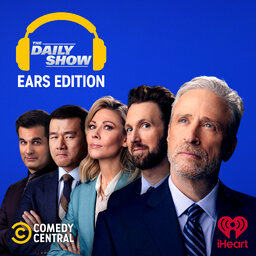Actor Elizabeth Banks discusses her film “Call Jane” about The Jane Collective of Chicago, which provided abortion health care pre-Roe v. Wade, the dangers and desperate situations people find themselves in when they don’t want to be pregnant, and her goal to destigmatize abortion procedures.
In 1 playlist(s)
The Daily Show: Ears Edition
Jon Stewart and The Daily Show News Team cover today's biggest headlines. The “Ears Edition” of The …Social links
Follow podcast
Recent clips

TDS Time Machine | Space!
32:23

Elon’s Grok Chatbot Turns Hitler & Marco Rubio Gets an AI Imposter | Lauren Greenfield
34:52

DOJ Erases Epstein & Netanyahu Kisses Trump's Ass With Peace Prize Nom | Author Michael Luo
34:00
 The Daily Show: Ears Edition
The Daily Show: Ears Edition